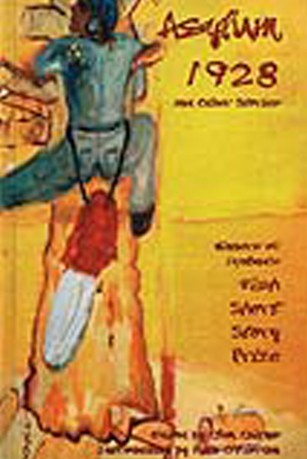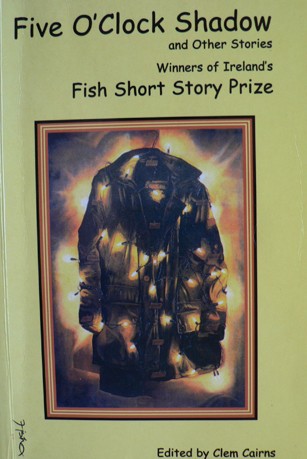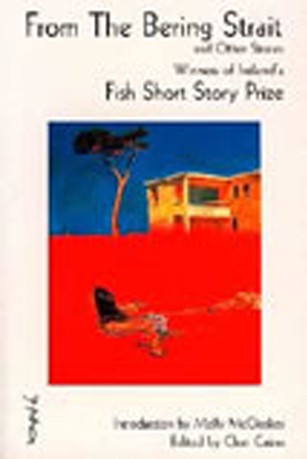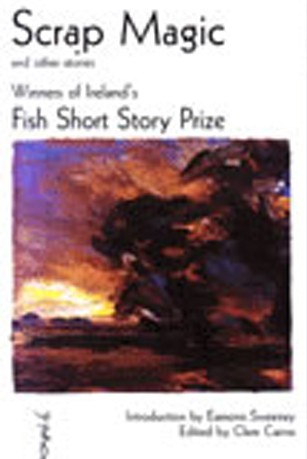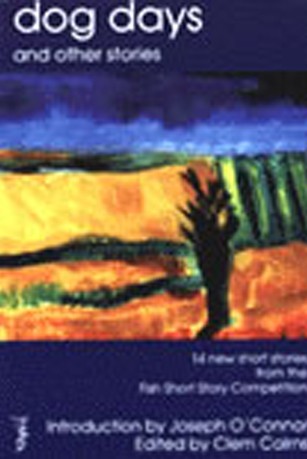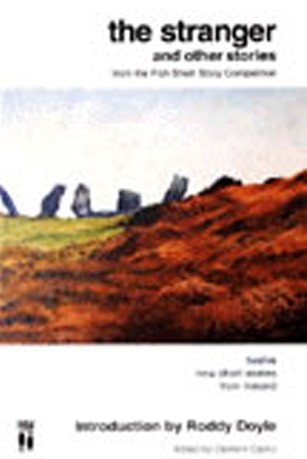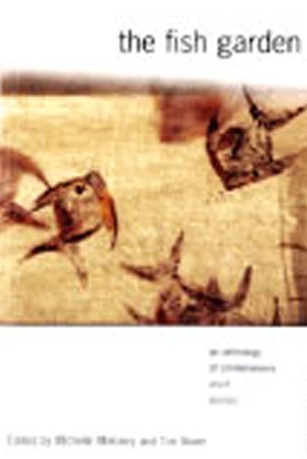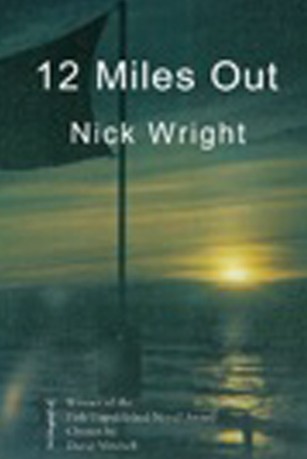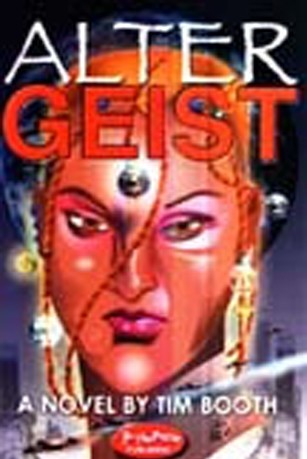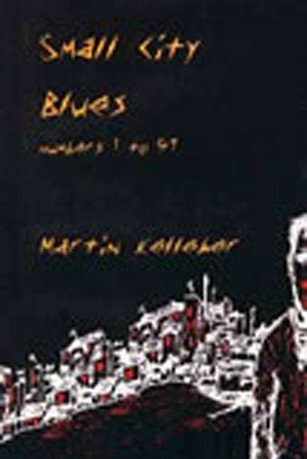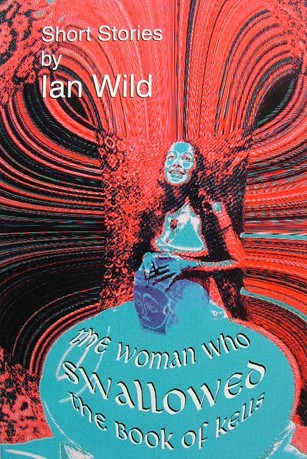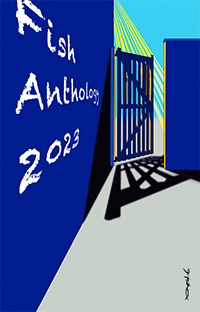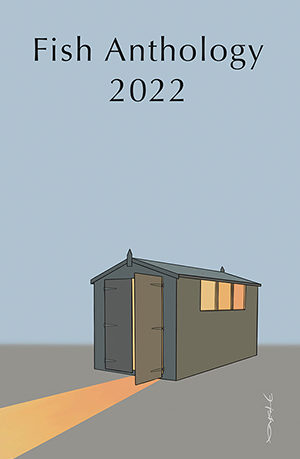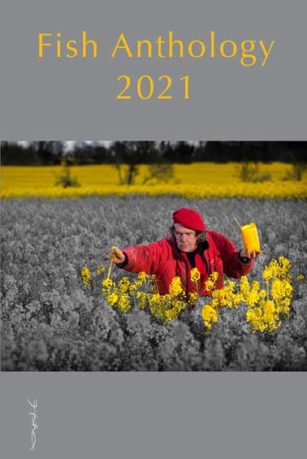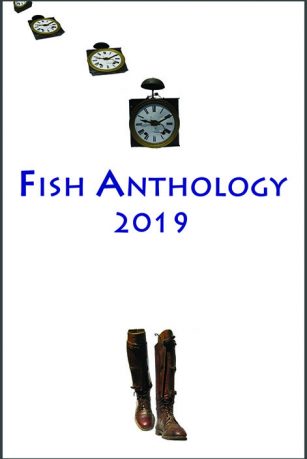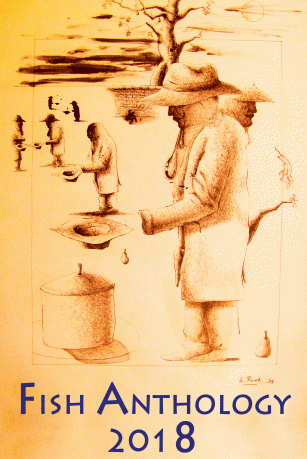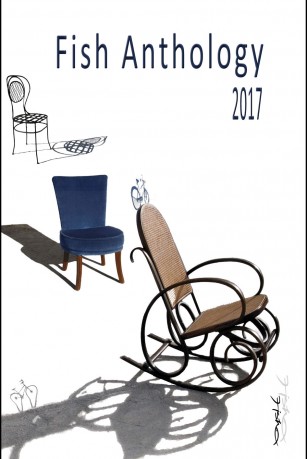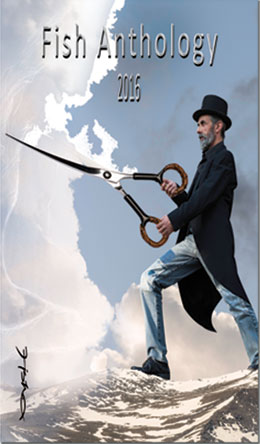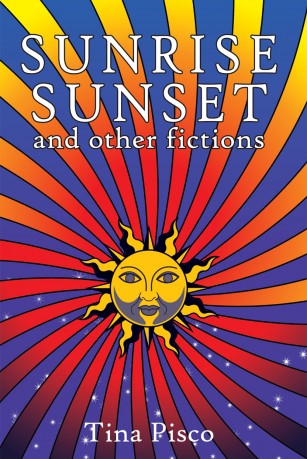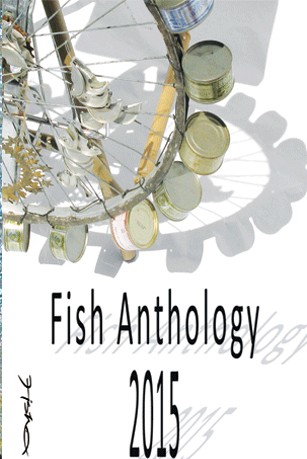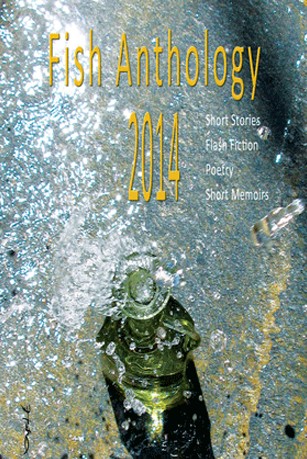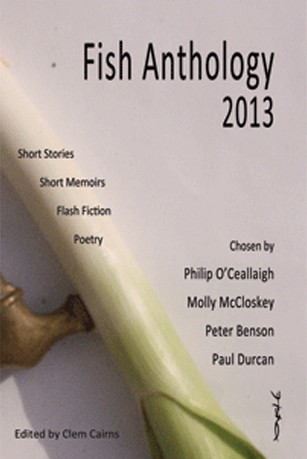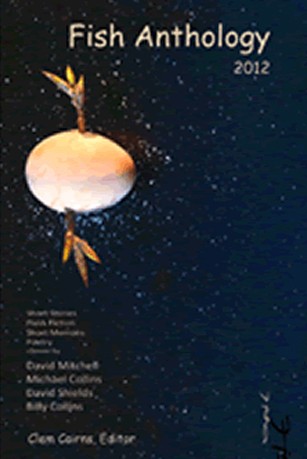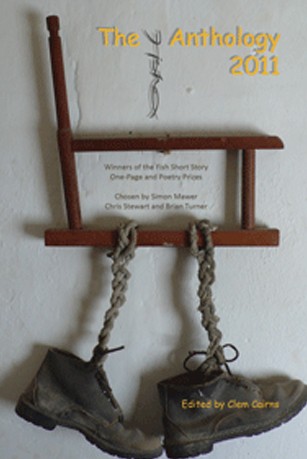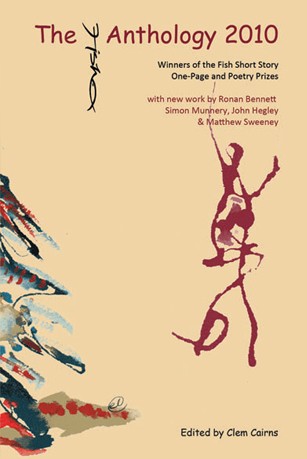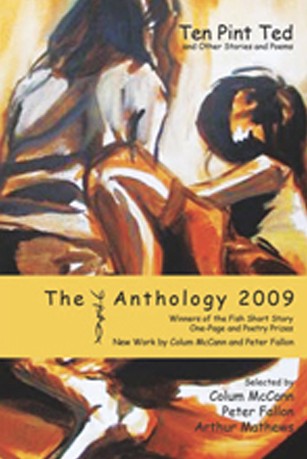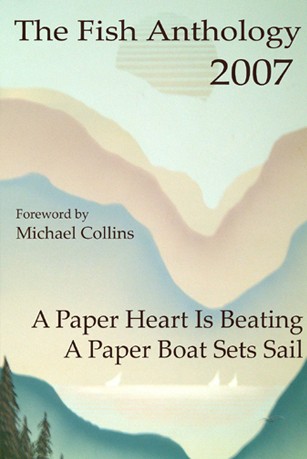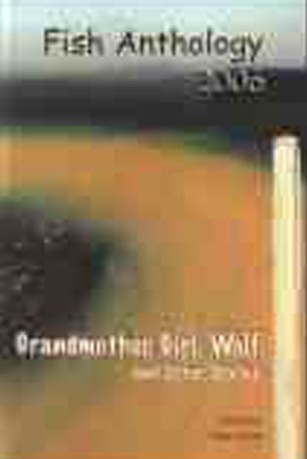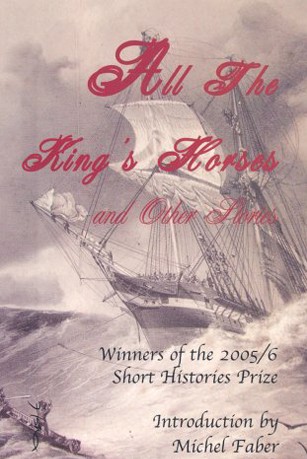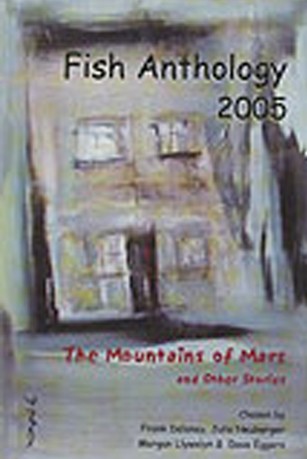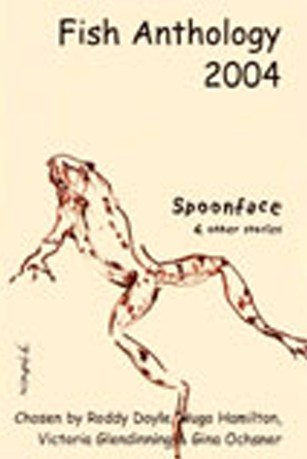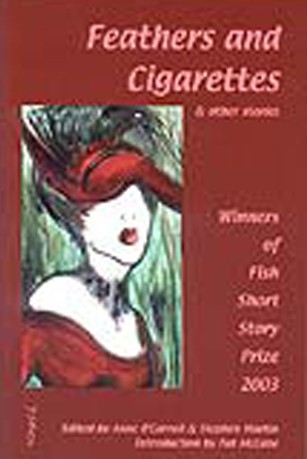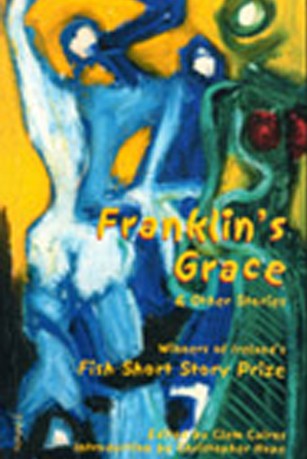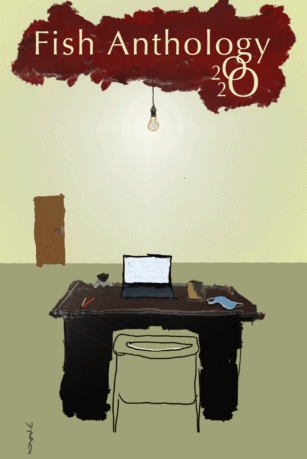
Fish Anthology 2020
SELECTED BY:
Colum McCann ~ Short Story
Tania Hershman ~ Flash Fiction
David Shields ~ Short Memoir
Billy Collins ~ Poetry
Read an excerpt from winning short story – 25:13 by Tracey Slaughter
Read winning flash story – Morning Routine by Kim Catanzarite
Read an excerpt from winning memoir – Buck Rabbit by Noelle McCarthy
Read winning poem – Father by Peggy McCarthy
Lockdown Prize
Introductory Note
by Colum McCann
Every February, in my job as a creative writing teacher, I read literally hundreds of short stories from people all over the world. I know that at some stage I’m going to make a mistake. It’s natural. Maybe I just can’t see the one line or one paragraph embedded in the story which suggests that a promising writer is embedded in there. Maybe I bring my own preconceptions to the text. Maybe I don’t have the range to hear the music of the text. But undoubtedly I will get it wrong somewhere along the line. That’s one of the reasons why I am a little reluctant to judge literary competitions: they are a wonderful forum for a new writer, but they have limitations. And so I’m always torn when I get asked to judge. The most promising voices to me might have already been sidelined. Or I might overlook something myself. I might not be able to see through my own preconceptions.
I have been the beneficiary of awards in the past and I know how they can kickstart a career. In particular, in judging this prize, I was looking for talent that would possibly last. Voice was very important to me. Style. And then story.
I feel a certain guilt about aiding and abetting a Literature Olympics because in truth there is no gold, silver or bronze. There were many fabulous stories in the final batch that came my way. I could see great stretches of imagination. I saw experimentation. I saw novelty with voice and style. I saw sentences that embraced both meaning and music. And in the end that was why 25:13 came in what we call first place: it has the music and it has the intention. It has all the landmarks of a true writer. I expect we will hear great things from the author. So too with Oh Bend Your Backs! and I think a little time in the editing room could really sharpen this voice into a Kevin Barry-like maestro. And there was something very genuine and earnest and well crafted about Fearfully and Wonderfully. And yet all the stories had something wonderful in them …
Keep writing, keep reading, keep creating. And rage on …
Contents
SHORT STORIES |
|
|
25:13 |
Tracey Slaughter |
|
Oh Bend Your Backs! |
John Mulkeen |
|
Fearfully and Wonderfully |
C S Mee |
|
A Letter from the North |
Donna Brown |
|
Statue of the Future Martyr |
Stephen Flanagan |
|
Little Wren |
Rosie Cowan |
|
Dado |
Sheila Armstrong |
|
Billboard |
David Munro |
|
The Sorry Business |
Róisín McPhilemy |
|
Walnut |
Bruce Meyer |
|
FLASH FICTION |
|
|
Morning Routine |
Kim Catanzarite |
|
Blink |
Mary McClarey |
|
Bog People |
Anne Cullen |
|
Domesticity |
Claire Powell |
|
Recipe for Disaster |
Jan Kaneen |
|
Reclining Nude |
Stella Klein |
|
The Abnormal Normal – Belfast 1970 |
Jennifer O’Reilly |
|
The Other Flight of Icarus |
James Wise |
|
When you look down the throat of a doll there’s nothing inside |
Rosie Garland |
|
Throwing Cockerels |
Alan Passey |
|
LOCKDOWN |
|
|
Out For a Duck |
Paul McGranaghan |
|
Six Feet Away |
Shamini Sriskandarajah |
|
My Pawn Gently Sleeps |
Shamini Sriskandarajah |
|
Corporate Fallout |
Lee Nash |
|
April |
Julia Travers |
|
Leaving this Lockdown |
James Allan Kennedy |
|
Self-isolation |
James Allan Kennedy |
|
Fran Lebowitz is not happy |
Emma Gallagher |
|
Lost Connection |
Jennie Ensor |
|
Safekeeping |
Gráinne Murphy |
|
Change |
Rachel Parry |
|
Daughter |
Ash Adams |
|
a measurement of silence in one hundred words |
Rosaleen Lynch |
|
SHORT MEMOIRS |
|
|
Buck Rabbit |
Noelle McCarthy |
|
Inner Core |
Miki Lentin |
|
The Road to Salamanca |
John Martin Johnson |
|
Roman Quartet |
Tom Finnigan |
|
Catch Me If You Can |
Julia Motyka |
|
Brief Notes to My Brother’s Other Sisters |
Lisa K Buchanan |
|
Moulded |
Phil Cummins |
|
Regeneration |
Laura-Blaise McDowell |
|
Leg Man |
Alan McCormick |
|
What Are Young Men to Rocks and Mountains? |
Maán Jalal |
|
POETRY |
|
|
Father |
Peggy McCarthy |
|
Some pleasures |
Vanessa Lampert |
|
Wild and Alone |
Susan Musgrave |
|
Shoegazers’ Companions |
Allen Tullos |
|
Dead Ant, Dead Ant! |
Michelle North-Coombes |
|
Edisto Island, May 2019 |
Celeste McMaster |
|
The Taking of Caravaggio |
Bill Richardson |
|
My Glacial Erratic |
Leah C Stetson |
|
On Reading Ecclesiastes 5 at St Patrick’s Church of Ireland Cathedral |
Angela Long |
|
The Mothers and My Mother Tongue |
Geoff Burnes |
25:13
by Tracey Slaughter
It is raining out on the field today when I get back from the hospital, and I find myself smiling, as if I called it up. I stand at the ranchslider that squares my lounge off with the turf and watch the downpour chasing off the onlookers. There are mothers out there who’ve thought to bring shelters, staked out a shanty claim of plastic on the sideline, parka’d up the younger kids. They’ve squatted in spiny pop-up deckchairs pre-game to guarantee their view is prime. Those mothers fight the longest. They’re still in place when a rush of umbrellas heads off, the deluge whirling from their red and white panels. Everything club-coloured, chillybins and snap-backs, pvc ponchos and first-aid kits, bumping in retreat along the flooded green sod. In the end it’s just me and those mothers, huddled in resistance beneath their branded tarps. Watching the team still stumbling the muck, as the sky proves no one can hope to stop it.
When Ryan was a child we had to rush him to hospital. I remember, the walls were lemon then too, and the frieze was a march of ducklings, grins of goofy fuzz with blue gumboots on their webs and sky-blue plastic hats. It was raining on them, but that only made them cuter. I hated the things, galoshing around in the splash, their peach beaks smirky and dimpling. I think Ryan hated them too. He hated the whole room, and everyone in teal that entered into it, carrying wires to the bed, and liquids, and trays, and needles, and lastly, straps. They’d plug and stick him, maintaining near-smiles, and gag his howl with clear-gloved fingers. We never had to guess his hatred. He screamed at them all, loud belts of terror, pitched from the struggle of his trunk, his blond-white hair spiked with fever, his milk teeth in fits. And it was my job to hold him down, to pin the tiny hammer of his heartbeat to the trolley, to lock down his clattering flannelette pj’s with their pattern of choo-choos all jumping the track. To use my whole body if I had to, like a vice, bear down on my baby, his flailing heels and wrists. Mutter everything I could find of comfort, while his head swung side to side and bludgeoned up at me. Keep on with a babble of falsetto sweetness, crossing my heart with fake promises. Hating the ducks the whole time, their chubby parade around the walls where the squeaky-clean blobs of entertaining rain would never drop down hard enough to drown them.
Let the rain come. Last weekend, when there was another minor incident, I stood at the window and watched while the ambulance coasted, low-profile, through coloured margin flags. While the stretcher was manoeuvred off, swift, unobtrusive. While the game played on. And those mothers never moved. Except one. But she wasn’t from the home team.
Morning Routine
Kim Catanzarite
I opened a can of cat food and grabbed a saucer and one of the forks nobody likes and scooped out the food and gave the fat one the fork to lick and gave the kitten the full saucer and lifted their water dishes from the floor and filled them up and then turned the lights on in the living room and raised the blinds in the eating area and made my way to the fridge and put the bread in the toaster and grabbed the butter before tapping out the allergy medicine and her ADHD medicine and her other allergy medicine and pouring her glass of water. Then I put the kettle on and grabbed the brush and dustpan and picked up some mud that tracked in on her shoes the night before, and then the toast popped and I buttered it and she came in and said “good morning” and asked me if her socks matched her outfit and I said yes and she told me it was cold outside and that she was going to freeze her ass off at the bus stop if I didn’t drive her there, and I told her that she would live, and she breathed out a cloud of disgust and said that if the puddle down the road was enormous like it was the other day I would have to drive her because she couldn’t get around it, it was so big, and I stared at her and said nothing because that’s often the best response, and then she looked out the window and also said nothing, so I knew the puddle was gone.
Buck Rabbit
by
Noelle McCarthy
“Get in ‘til you see what we got you. This is my daughter.” Mammy is loud, showing off for the driver. The cab smells of drink and Estee Lauder. Wherever they’ve been, they’ve been there all morning. Angela is jammed in the back, the big cardboard box on her knees shaking violently.
“You’ll have to mind him, give him curly green cabbage.” Mammy taps the side of the box. It lifts a few centimetres up into the air, sides bulging. Angela throws herself forward over it, Medusa curls flying, the ash from her fag goes all over the seat in front of her. I reach for the seat belt. It’s way too long for me. “Up past the crucifixion please.” Mammy sounds haughty. His knuckles are white on the steering wheel. They’d have kept him outside The Chimes a good half hour. There’s loud scrabbling from the back, the witchy sound of long nails scraping. The statues blur past: dying Christ, his weeping mother. “Father, Son and Holy Spirit. Come on, girl!” Mammy blesses herself theatrically, insists I do the same. The driver thumps his chest three times with a vengeance.
The worst is not when she keeps them waiting, the worst is when she won’t pay them. A guy the other night pulled into the Guards Station. She got out with the glass still in her hand: vodka and lime. Dwarves, Angela calls them. We pretended to be asleep when the Guard came out, me and John Paul in our school uniforms. Something cold pressed up against my leg, the bag with the crispy pancakes. They put her back in the car eventually. The Guard must have told the driver to bring us home. Daddy gave him some money and flung the crispy pancakes all over the hall on top of her.
Passing the asylum, the box flies open. A savage kick, a flash of fur, thrilling and alien. Angela tries to jam the flap back down. “For fuck’s sake, hold onto him!” Mammy is high, triumphant. Children’s allowance day, maybe. Not The Chimes, The Raven. Up to Sullivan’s afterwards, the clock running down on them, buoyed by dwarves, unusually monied. Past the soft green glow of the fish tanks, up the back to the long rows of biscuity-smelling cages lined with sawdust. Fluffy piles of fawn, grey, tortoiseshell. Five pounds for a guinea pig, rabbits for a tenner. Three brothers own it, or four. Country people, they all look identical. The mice are only eighty-five pence, but I’m not allowed them anymore, after the last time. I am deeply excited about whatever is in the box, even though it’s Angela holding it. Her son catches pigeons when we’re outside The Chimes, just throws his jacket over them. I don’t know what happens to them afterwards. She’s trying to keep the box steady. Whatever’s inside is trying to tunnel through the bottom.
Father
by Peggy McCarthy
Coming in I often pass you in the hallway, in sepia,
your wedding day, June 1955. You couldn’t believe your luck.
And sometimes I stop to catch a trace of something I missed.
Maybe it’s the way the light catches the glass
I think I almost see you clearly
but mostly you give nothing away.
Clear-eyed, upright photo-stance,
a peep of handkerchief in your breast-pocket,
your first and last trip to the photographer’s studio.
Right hand put away behind your back
your left-fingers folded in a fist,
elbow tentatively crooked for your new bride.
Going out, I sometimes glance at you again,
this time it’s the other photo, a dozen years after the first.
Your farmer’s grind cast briefly aside,
your brow furrowed, your slack half-smile.
And what do I really know? You were not for turning
from buckets and wells to pipes and plumbing,
from bicycle clips and tilly lamps to motor cars and electricity.
You knew land and fields and the cuckoo’s call.
You said the best part of the potato lies under the skin.
These things hold steady when I pass through
angling to catch a glimpse of something new in the fading
greys and blurry edges of an overcast summer.


